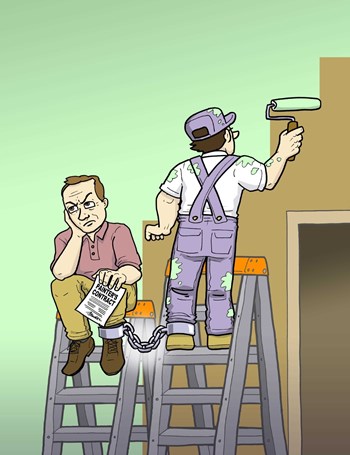
The vast majority of both one-time projects and long-term service contracts involving vendors and service providers and their condominium or HOA clients go smoothly and either conclude or continue without incident. However, a small percentage of jobs do jump the tracks in one way or another, and when that happens, things can get complicated. Sometimes it’s a contractor’s inability to stay on schedule or stick to an agreed upon budget that does it; sometimes it’s the quality of work itself that’s not up to par. Whatever the cause, sometimes it’s necessary for condo administrators to pull the plug on a contract—and that sometimes can be easier said than done.
Breaking Ties
Before any contracts are signed, experts agree that associations should make sure that all vendors and service providers are properly licensed and have a good record with the Better Business Bureau, for more information log onto www.newjersey.bbb.org. Another useful search is your county’s Clerk of Courts office to determine whether the contracting firm or its principals appear in litigation.
There are numerous reasons why a condominium or HOA manager or board might feel it necessary to break a contract with a vendor or service provider, but according to Anne Ward, senior counsel in the Condominium Law department of Ehrlich, Petriello, Gudin & Plaza in Newark, “The most common reason is because there’s been a breach on the part of the vendor. In other words, they haven’t lived up to their part of the bargain—they’re not providing the benefit that they’re supposed to be providing, and that’s a reason to terminate the contract.”
“The most popular reason I see is that the service is not satisfactory, poor service or it’s not compliant with the agreement,” says Scott Piekarsky, a Wyckoff-based attorney and managing member of Piekarsky & Associates, LLC. “That’s typically the reason why one wants to switch vendors.”
“Any breach of any material terms of the agreement is a reason for a condo or HOA to feel it necessary to break a contract,” adds Eric Frizzell, a partner with the law firm of Buckalew Frizzell & Crevina, LLP in Glen Rock. “That would include failure to perform services properly, failure to be on-site during required periods, and failure to respond within required time frames on a service contract. For example, an elevator service contract might require the service company to respond to a report or a complaint within a time frame and failure to respond promptly can be a detriment to the building, especially in a high-rise. Other reasons could be misconduct by workers directed toward homeowners, any type of inappropriate conduct or alcohol on the premises during work hours. There could be all sorts of reasons.”
Writing the Contract
The association should decide what it wants to accomplish in a contract, and to be sure everything is included. In negotiating and writing a contract, an association board should rely on advice from its manager and management company, attorney, and consultants—but the board makes the ultimate decision on the terms to which it will agree.
“The best way an association can protect itself against contractor problems is through written contracts,” says Piekarsky. “Written agreements with clauses to provide for extrication, exit and cancellation if there is a problem. Standards can be set, representations can be sought, warranties and guarantees obtained, and a procedure where if there is a problem, they give notice and an opportunity to cure. There’s also the basic, obvious stuff in writing a contract; who the parties are, what the service or product is and the pricing and the timing to deliver.”
“Too often associations will enter into contracts without having their attorney review them and the contracts will fail to adequately specify what the contractor is going to do,” says Frizzell. “One instance where this arises, a contractor will submit a one-page proposal and the association considers that proposal to be a contract, when in fact it normally needs to be fleshed out in great detail with regard to services that are going to be provided, remedies and numerous other provisions, such as insurance and indemnification.
“So two key provisions in any contract, with any contractor or service provider, are insurance provisions to make sure that they provide proof of adequate insurance,” Frizzell continues, “and that they provide an endorsement that names the association and management company and board additional insureds,” says Frizzell. “And an additional provision that says in simple terms that if the contractor breaches the contract or is in violation of any law or is negligent in any way causing damage to the association or any of the residents, the contractor is going to fully indemnify the association.”
“The critical thing is to have a contract drafted which makes it clear they can terminate for cause,” adds Ward. “Most contracts provide that they can terminate for cause and that you have to give a certain amount of notice. The best way to draft it so that if there is cause, you don’t have to give that much notice, or otherwise you have to pay those monthly fees, so it has to be a contract which is drafted carefully. The contract that the association has with a vendor should be very clear in terms of what that vendor’s obligations and responsibilities are. That’s more important than anything else.”
Here are a few additional elements real estate experts believe that associations should seek to include when writing a contract:
• Termination for no cause, which could occur if the association board decides to get rid of a contractor it doesn’t like, if a new board or management company wants to replace the contractor with another it prefers, or if the board elects not to complete a project that is already underway. Then the association must pay the contractor for all costs and expenses he incurred prior to the termination.
• A default clause, which allows the association to cancel the contract if the contractor doesn’t cure a default within a specified time after notice by the association. The time to cancellation may be five, 10, or 30 days.
• A description of the work to be done, including a comprehensive scope of work statement, and a schedule of values containing a complete breakdown of quantities of materials and labor and their associated costs.
• A schedule that specifies three dates: when the work will begin, substantial completion, and final completion.
If Problems Arise
Piekarsky believes that if a contract dispute develops, the board should first approach their management company. “It depends on the level of the problem, but typically it’s a situation where the manager will try to work it out,” he says. “Maybe the problem is an oversight, a misunderstanding, maybe the owner or foreman didn’t know about the oversight. So first you try to work it out through amicable and friendly means to resolve it. Many times it’s a one-time thing and unintentional. Beyond that, sometimes it requires getting the association’s attorney involved and thereafter there may be drastic measures of terminating and in the most serious and drastic cases, there may be litigation.”
“The board should keep good records with respect to what’s occurring,” says Ward. “For example, ‘say you have a vendor that said they would have a receptionist or somebody on the premises visible at all times,’ and ‘let’s say, they’re not living up to their responsibility,’ somebody should be taking notes and keeping records. For instance, ‘say, on May 22nd there was nobody on the premises.’ So if you end up going to court you have a record of the breach and you should send advance notices to the parties in question.”
“If there is a problem, you want to sit down as soon as possible with the contractor and review your areas of concern. You definitely want to try to work things out,” adds Frizzell. “You also want to be careful to not make a statement that is inadvertently prejudicial to the association in the event, you can’t work things out and it ends up in litigation. Sometimes, people may be afraid of confrontation so they minimize what their concerns are. They may make a statement like ‘this really isn’t a major issue,’ or something along those lines. You don’t want to make those types of statements. You also want to get your attorney involved, earlier rather than later.”
Most Contentious Contracts
Certain types of repairs and services are especially prone to contract disputes, construction-law attorneys say. Roofing jobs, concrete restoration and replacement of windows and sliding glass doors are notorious for generating disputes, as are landscape maintenance and solid-waste collection agreements.
“Construction related work is a very good example,” says Piekarsky. “My opinion is because you have so many variables from the quality and the nature of the product to the skill of the workmen and the weather conditions. There are just so many variables, and if they're all not just right, something that can seem so simple to do can turn into a disaster. The big thing is experience and reputation; when you’re working with a vendor who has good references you’re probably not going to have those problems.”
“I think that there’s a greater chance for disagreements about whether the services are being properly performed,” adds Frizzell. “If someone is supposed to provide you with an A-B-C brand photocopier and that’s in the contract, you either get it or you don’t, the more specific the better. If it’s a materials contract it’s easy to confirm if you received the materials you ordered, but if it’s a services contract and the contract is drawn with terminology that is too vague that can lead to disagreements.”
In closing, dealing with contracts—including extricating your board or association from one that's no longer meeting your requirements or expectations—boils down to doing your homework beforehand, making your needs and standards clear (and making sure they make it into the language of the contract) and involving your legal counsel earlier in the process rather than later. Following this protocol will not only save you time and headaches, it will save your building or HOA money in the long run.
George Leposky is a freelance writer and a frequent contributor to The New Jersey Cooperator. Staff writer Christy Smith-Sloman contributed to this article.






Leave a Comment